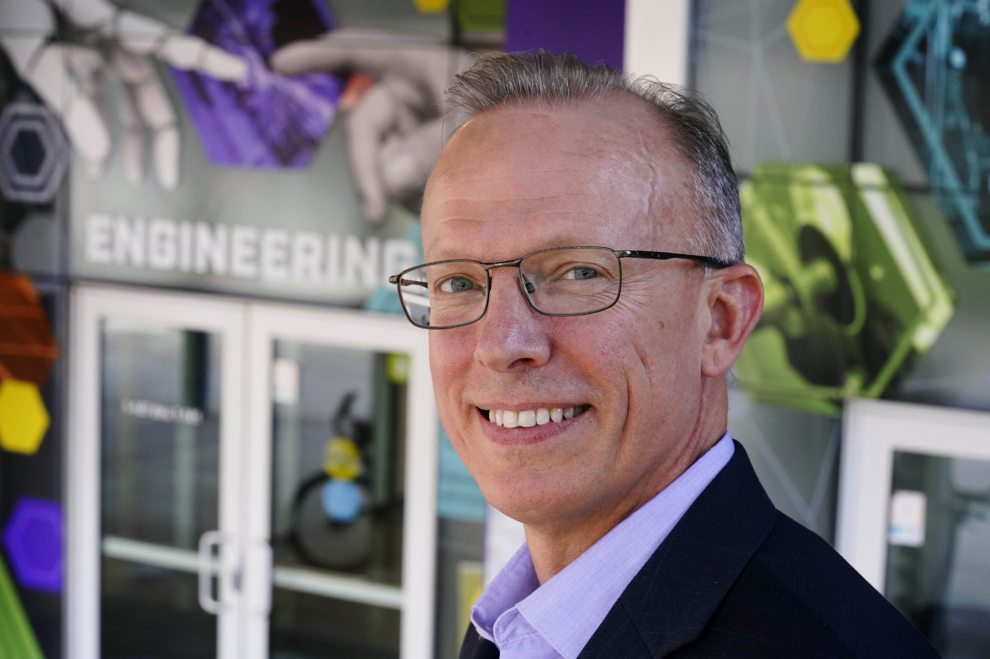Paul Lambertson doesn’t let the grass grow beneath his feet. As soon as he turned 18, the new dean of Grand Canyon University’s College of Engineering and Technology looked to the skies and space – and the prestigious U.S. Air Force Academy – to get him there.
He studied space operations, “which is, basically, engineering for Captain Kirk – and that’s what started my journey. I was even assigned to Cadet Squadron Starship 19, based off ‘Star Trek’s’ Starship Enterprise.” He banked on making his dream of becoming an Air Force pilot come true, though eyeglasses almost grounded that dream of flight.
“Interestingly enough, I got glasses my sophomore year at the academy. Barely passed the flight physical,” said Lambertson, smiling broadly in his Engineering Building office.
Just a few weeks into the job – he arrived on campus Nov. 1 – he’s not had a lot of time to decorate, though a few models of aircraft line one of the shelves beside him. The rest of his collection will soon arrive from Huntsville, Alabama, where his family recently packed up and will soon follow him to the Phoenix metroplex.
But he did pass the physical and overcame another challenge: “I went into flying then discovered that air sickness is a thing, which wasn’t fun for me. But I got over it and became a pilot.”
It was off to the races from there, moving every one to four years all over the country. He flew missions all over the world, mostly as a mobility pilot in the Boeing C-17 Globemaster III military transport aircraft, though he is trained to fly seven types of aircraft. He has flown to places like Monrovia, Liberia, for a combat medical evacuation of Marines, and the Ice Runway on McMurdo Sound in Antarctica supporting the National Science Foundation.
His last assignment before retiring, after serving in the Air Force for just over 20 years in various leadership roles, was back at his alma mater, the Air Force Academy. He allowed his engineering prowess to kick in while also teaching cadets to fly. He was the director of Systems Engineering and chair of the Systems Engineering Working Group at the academy. He led the program and the final stages of accreditation from ABET (formerly the Accreditation Board of Engineering and Technology).
After two years, he started another venture, this time in industry, at the Boeing Co. in the Seattle area and also in Huntsville.
“Boeing does such amazing and groundbreaking things. I always thought of Boeing as a service organization, and I had the privilege of working with truly fantastic people.”
He was Boeing Commercial Airplane’s Systems Engineering chief engineer, the Systems Engineering and Integration leader for the twin-engine jet 777X, and the program manager/production engineering leader for two factory production system organizations. When he retired the second time, it was as Boeing’s Enterprise Product Standards leader.
The fast pace he lived in the Air Force and at Boeing hasn’t slowed since his arrival at GCU in a position made possible by GCU Provost Dr. Randy Gibb. They both served at the Air Force Academy, where Gibb was the department chair of the Behavioral Science and Leadership Department when Lambertson led the Systems Engineering program.
They collaborated on projects, and, as pilots and leaders, knew many of the same people.
“We had not crossed paths for nearly 10 years,” said Gibb. “I called Paul out of the blue and asked if he knew anyone from our Air Force days that taught engineering at the Air Force Academy that would be interested in being the dean of the College of Engineering and Technology at GCU.”
“He was just looking for ideas,” Lambertson said. “I said, ‘I’m an idea.’” He’s now bringing his own ideas to GCU.
“It’s very busy. There’s a great deal of work to do,” he said of going into “workaholic mode” while his family is away from him in Huntsville, allowing him to focus solely on his job. Workaholic mode is appropriate, he said. “It requires a lot of hours.”
Lambertson doesn’t come from an engineering family. His father was a pastor and pastoral counselor; his mom, a 40-year educator, high school principal and district executive director.
“There was always this inquisitiveness in the house, and certainly for me,” said Lambertson, who was raised by a single mom after his parents divorced when he was 6. “I found over time that I really resonate with logic, facts and data. I’m a facts-and-data guy. That’s where engineers usually live.
“I’ve always loved the engineering method of how you can really work through a problem from multiple, different angles and then be able to glean what the actual truth is.
“I’m fascinated by it.”
Lambertson worked with students at the Air Force Academy and is ecstatic to combine his two loves of engineering and education at GCU.
He is the first dean of the new College of Engineering and Technology, though the University’s engineering and technology programs existed previously under the umbrella of the College of Science, Engineering and Technology, which recently split into CET and the College of Natural Sciences.
Lambertson said his vision as dean is, “How do we, as a college, fit into Provost Gibb’s and President (Brian) Mueller’s broader vision of the University? How do we help the University continue to do what it does for human flourishing?
“That’s it. That’s the bottom line. That’s what we do.”
For Lambertson, lending to that vision of human flourishing in his college means expanding the engineering program and getting more traction with industry. About two weeks ago, “We put eight new programs into the system. Now, it will take one to two years (to bring those programs to fruition), but we are aggressively pursuing new engineering degrees.” He said GCU wants to add systems, civil, aeronautical, astronomical and digital engineering, to name a few.
“All of these things we could be creating to support and serve our community. I’ve said this a bunch of times. But I believe that there are Christian worldview people everywhere who really want to come here if we just had a program to offer that resonated with them. So let’s do that.
“I think there’s a huge demand. ‘Field of Dreams’ quote: ‘If you build it, they will come,’ right? So that’s the focus.”
Technology-wise, Lambertson said, GCU already offers world-class programs.
“We’re looking at how we can, not just grow our programs, but improve how we share and advertise and market those programs. Here’s a good example: If you’re going through a cyber degree and there is a certification that the industry provides or recognizes, why shouldn’t you also get credit for that industry cert? We’re trying to figure out how to tie those things in.”
He also wants to make sure to build on his new college’s identity, from making a move as simple as changing the Engineering Building signage to say College of Engineering and Technology.
“But how do we stitch ourselves together as an identifiable and understood college? That’s going to be an interesting journey for us.”
He’s also thrilled that he can live out his faith at GCU.
“In industry, and even in the military, they are primarily secular – very, very secular. I have always tried to live as an example that Christ provides,” he said. “I can do that here without any shackles.
“That’s HUGE. That’s mind-blowing for me, and so, personally, I plan to continue to live a good example and let that permeate and set the tone for the college. I don’t say that as a statement of pride. Not at all. Jesus Christ is my Lord and savior. My job, my sole function, is to help that go through to others, and I get to fully embrace that here at GCU.”
Source: GCU News










